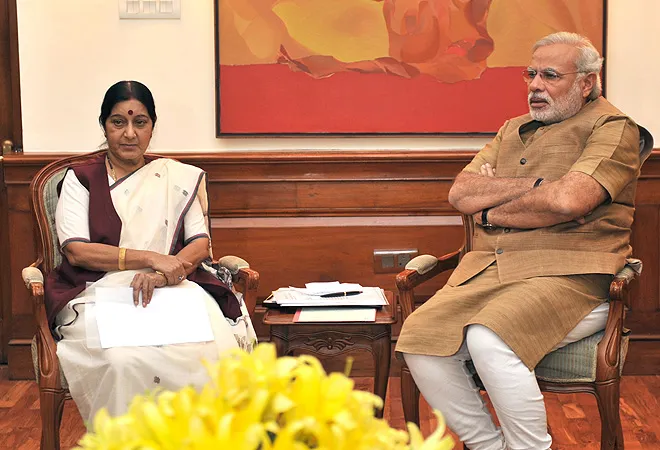As is her wont, the external affairs minister, Sushma Swaraj, was at her fiery best in Parliament recently while responding to a heated debate on Indian foreign policy. She covered a wide terrain, from Pakistan, China West Asia to Indian diplomacy. While doing so, she managed to land a few strong blows on the Congress, which is losing touch with political reality as its base shrinks across the nation.
Although China has continued to ratchet up pressure on India, even threatening war at times, Swaraj made it clear that for New Delhi war was not a solution and that India remained keen to resolve the border stand-off with China through dialogue. "Patience and bhasha saiyam (restraint) are very important to resolve the issue. If there is no restraint, it provokes the other side," Swaraj underlined for Indian parliamentarians. This she asserted after China's foreign ministry issued a 15 page statement, which said that the number of Indian troops in Doklam had fallen from a peak of more than 400 to about 40 at the end of July.
But soon after the statement, the Indian government confirmed that there had not been any withdrawal of Indian forces and the position on the ground remained unchanged.
Swaraj also used her address to express her displeasure over Rahul Gandhi's meeting with the Chinese ambassador, Luo Zhaohui, in July. She complained that the opposition leader had met the Chinese envoy without seeking information about the stand-off from the government. The larger reality of the stand-off continues to be shaped by the Indian government's stance that both sides should pull back their troops before any talks, even though China has set the unilateral withdrawal of Indian troops from Doklam as a pre-condition for a dialogue.
New path
Swaraj also took on the opposition directly over the charge that her government had no policy to deal with Pakistan. She argued that India did indeed have a roadmap for peace but it could not be one-sided."Terror and talks cannot go together. The day they stop promoting terror, we will start the talks," Swaraj said.
The Narendra Modi government has taken a new approach towards Pakistan and Kashmir. It has led a high-voltage global campaign to isolate Pakistan for being a sponsor of terrorism while giving greater operational autonomy to the security forces to deal with aggression on the border.
On Kashmir, instead of talking to the Hurriyat leadership, it has begun to tighten the screws on the Hurriyat, underscoring how funds were being given by Pakistan-based terror outfits, including the Lashkar-e-Toiba, to disrupters in the Valley. This government is in no mood to cede any political space to the Hurriyat. This harder line is inevitably producing turmoil in the state and it remains to be seen what the endgame is likely to be. But, so far, the Modi government has not ceded ground to its detractors, even to its coalition partner in Jammu and Kashmir. Swaraj also cleverly deflected the charge that the Modi government is close to the US by saying, "You say that India stands alone. This is far from the truth...You say during 1971, the US was with Pakistan, and Russia was supporting India. Today both Russia and the US are supporting India. This reflects the success of our foreign policy."
Swaraj's intervention not only provided an overview of Indian foreign policy in the Modi era but it also delineated that Modi's foreign policy is a departure from that of his predecessors. She has made an eloquent case for it at a time when New Delhi is facing one of its biggest challenges in the form of an aggressive China at its doorstep. How her government handles this crisis will perhaps determine its foreign-policy legacy more than any number of eloquent speeches. The jury is still out on this case.
This commentary originally appeared in The Telegraph.
The views expressed above belong to the author(s). ORF research and analyses now available on Telegram! Click here to access our curated content — blogs, longforms and interviews.




 PREV
PREV


